In recent years, the healthcare industry has experienced substantial growth, particularly in the wake of a surge in healthcare app development. Statista forecasts a significant expansion, projecting global healthcare market revenue to achieve $57.86 billion in 2024. This growth is poised to sustain a strong compound annual growth rate (CAGR) of 10.40% from 2024 to 2027, culminating in an impressive market volume of $85.95 billion by 2027.
The upswing in this industry is driven by the growing inclination of medical organizations towards the healthcare mobile apps development, to elevate the overall quality of medical services. Key factors contributing to the escalating adoption of healthcare IT consulting services encompass:
- Augmented accessibility to healthcare
- Digital transformation within the healthcare sector
- Expanded outreach to healthcare users
- Enhanced health tracking and monitoring
- Streamlined and more effective delivery of medical services
- Early detection of potential ailments, among other factors
These elements collectively position mobile healthcare apps, often termed as mHealth apps, as an outstanding tool to simplify the lives of both patients and healthcare professionals, ultimately leading to an enhancement in overall patient care.
Developing mHealth apps is a recognized method for enhancing patient care and satisfaction. However, the majority 8 out of 10 of healthcare apps fall short of user expectations. This failure is often attributed to factors such as a lack of strategic planning, technical guidance, and a meaningful impact in addressing medical challenges.
Q. How much does it cost to develop a healthcare app?
Healthcare Market – An Overview
In the present era dominated by technology, where smartphones seamlessly blend into our daily routines, there is a notable surge in the popularity of mHealth apps. These applications empower individuals to have unprecedented control over their well-being. Therefore, it comes as no surprise that, in the year 2020, businesses and the digital health investorssector directed investments exceeding $21 billion into a variety of projects within the digital healthcare domain.
As per Statista’s findings, in the initial quarter of 2022, there were roughly 52,565 healthcare apps accessible on the Google Play Store and 51,370 apps on the Apple App Store. Following the onset of the global COVID-19 pandemic, there has been a 60% surge in healthcare app downloads worldwide.
Having explored the global market statistics of mobile healthcare apps, let’s delve into the realm of medical and healthcare app development.
What is Healthcare App Development?
Healthcare app development involves creating applications for mobile devices that enable users to effectively monitor and manage their health issues in real time. Additionally, these mobile healthcare apps provide users with convenient access to a range of medical information and healthcare services through a few taps on their mobile devices.
For example, the development of mobile health applications is highly recommended for various purposes, including Electronic Health Records (EHR), improving the overall medical service experience, enhancing hospital services, and facilitating the digitization of medical insurance claims, among other functionalities.
How is Healthcare App Development Different from Medical App Development?
Healthcare app development and medical app development, although both geared towards promoting well-being, showcase subtle distinctions. These differences manifest in their specific objectives, regulatory prerequisites, target demographics, and the type of data they handle. Therefore, understanding these variations is essential before initiating the process of developing your mHealth app.
Healthcare App Development:
The development of healthcare mobile apps seeks to offer health-related solutions compatible with various smartphones and communication devices. These applications cover a range of functionalities, including:
- Tracking physical activity
- Facilitating yoga and meditation
- Providing nutrition information
- Assisting in finding nearby medical help, among other features.
Medical App Development:
Development of medical apps entails creating software solutions for mobile devices utilized by medical professionals to manage their healthcare operations. These applications cover various functionalities, including:
- Telemedicine
- Remote patient monitoring
- Patient data collection and management
- Chronic disease management, etc.
Why is Healthcare App Development Essential for Businesses?
Healthcare software development or the creation of healthcare apps serves various objectives. It can streamline numerous administrative and healthcare management functions, enabling individuals to effectively monitor their health issues, access healthcare information with ease, maintain health records, and more.
In straightforward terms, the development of healthcare mobile apps fulfills the following roles:
- For doctors and medical professionals – It aids in patient monitoring, early detection of diseases, staff management, scheduling appointments, and more. Additionally, it enables medical professionals to consult with patients through video and audio conferencing, make diagnoses, and prescribe medications.
- For users – It facilitates well-being tracking, seeks medical advice, arranges at-home delivery of medical services, monitors fitness levels, assesses heart health, and schedules appointments.
Mobile healthcare apps empower users to conveniently access a broad range of medical services with just a few taps on their smartphones.
How is Healthcare App Development Different from Medical App Development?
Healthcare software development or the creation of healthcare apps serves various objectives. It can streamline numerous administrative and healthcare management functions, enabling individuals to effectively monitor their health issues, access healthcare information with ease, maintain health records, and more.
In straightforward terms, the development of healthcare mobile apps fulfills the following roles:
- For doctors and medical professionals – It aids in patient monitoring, early detection of diseases, staff management, scheduling appointments, and more. Additionally, it enables medical professionals to consult with patients through video and audio conferencing, make diagnoses, and prescribe medications.
- For users – It facilitates well-being tracking, seeks medical advice, arranges at-home delivery of medical services, monitors fitness levels, assesses heart health, and schedules appointments.
Mobile healthcare apps empower users to conveniently access a broad range of medical services with just a few taps on their smartphones.
Benefits of Healthcare App Development for Medical Professionals and Patients
The widespread adoption of healthcare app development solutions in businesses can be attributed to the numerous advantages they bring to both general users and medical professionals, thereby contributing to the advancement of the healthcare industry. Developing a healthcare app offers an array of benefits, allowing for the automation of operational processes and the enhancement of the financial performance of medical institutions. Let’s explore how:
Benefits for Medical Professionals
Creating a healthcare app is typically a resource-intensive and costly endeavor; however, it delivers substantial value to its investors and stakeholders through:
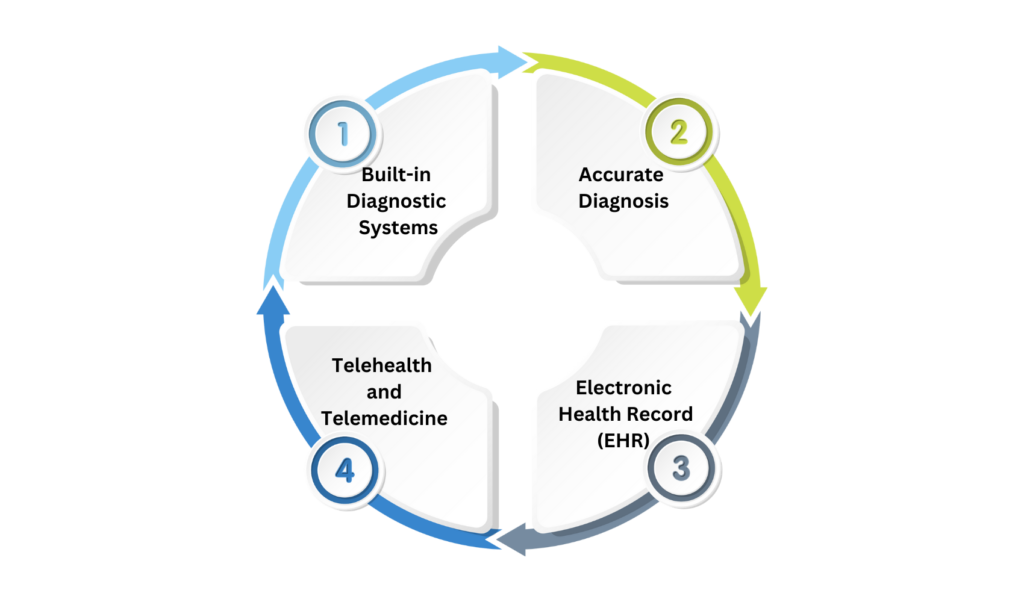
Built-in Diagnostic Systems
These systems facilitate the gathering and analysis of data from embedded and IoT devices seamlessly integrated with EHR platforms. Doctors can effortlessly assess and diagnose the conditions of patients at a distance, monitor their progress, and prescribe appropriate treatment.
Accurate Diagnosis
Healthcare apps empower medical professionals with early and precise disease diagnosis. The incorporation of accurate and built-in diagnostic systems leads to improved treatment strategies, timely healthcare delivery, and favorable outcomes. VisualDx, for instance, stands out as a premier diagnostic support system and healthcare app offering personalized guidance.
Electronic Health Record (EHR)
By integrating of EHR solutions, healthcare apps can efficiently monitor, store, and compile all patient-related information on a unified platform. This streamlines processes, reduces errors, and facilitates the seamless exchange of patient data among various healthcare institutions.
As an illustration, Uber incorporates an EHR system to simplify medical transportation. The on-demand ride-sharing company introduced Uber Health, enabling healthcare professionals to book and monitor rides on behalf of their patients.
Telehealth and Telemedicine
Telehealth stands out as one of the rapidly expanding applications in the healthcare industry, projected to experience a Compound Annual Growth Rate (CAGR) of 24.0% from 2024 to 2030, starting from the estimated market size of $83.5 billion in 2022. Presently, the demand for telemedicine and telehealth software solutions, such as SaMD (Software as a Medical Device), is surging, especially post the COVID-19 pandemic and increased social isolation.
As an illustration, the Doctor-on-Demand application empowers healthcare professionals to conduct consultations through video or audio calls. Moreover, it aids patients in conveniently scheduling appointments.
Benefits for General Users
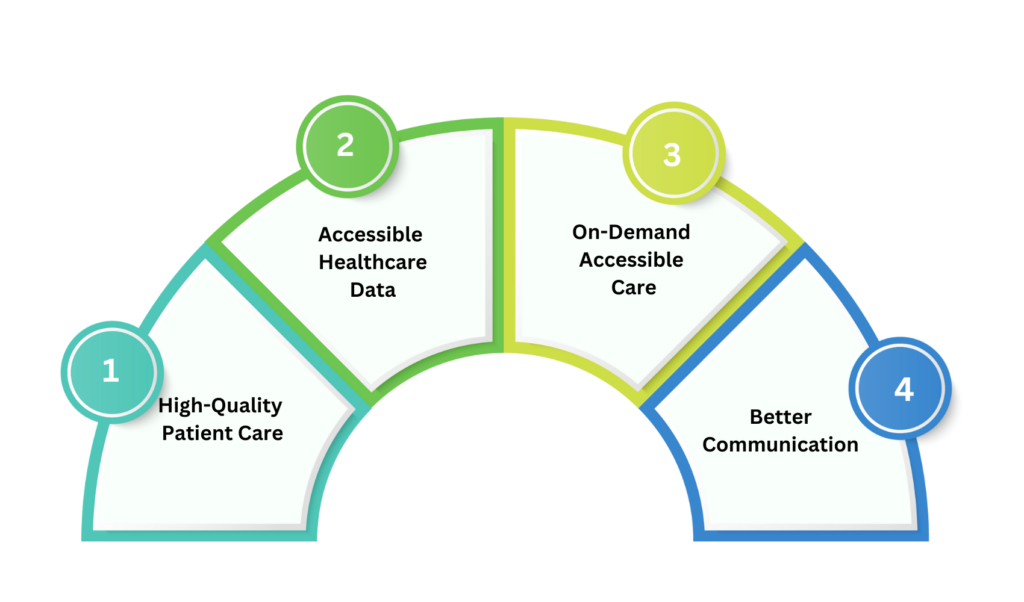
High-Quality Patient Care
Utilizing advanced healthcare apps for fitness, nutrition, and more, patients can monitor their disease symptoms, chronic conditions, sleep patterns, heart rate, and overall health through IoT-connected wearable devices or smartphone sensors.
Accessible Healthcare Data
A mobile app platform ensures convenient access to healthcare information and medical data, facilitating improved patient monitoring. Now, patients can easily retrieve healthcare information and updates from the comfort of their homes or while on the move, allowing them to share health data and symptom reports with their healthcare providers. For example, UpToDate is a mobile healthcare app that monitors users’ workflow, provides medical news, health kits, and tracks daily achievements.
On-Demand Accessible Care
Healthcare mobile app development ensures that on-demand medical services are readily accessible to every ordinary user.
Better Communication
Medical apps facilitate real-time communication between patients and caregivers. For example, YouCoMM, a multi-request format platform developed by Digiatto IT Services, enables in-hospital patients to connect with nurses for assistance with basic needs.
Types of Healthcare Mobile App Development
mHealth app development introduces various application types, playing a crucial role in advancing healthcare management and enhancing overall well-being. Based on their intended usage, healthcare apps can be categorized into two groups: applications designed for medical professionals and those tailored for general users. Let’s delve into each category and explore its subtypes in detail.
Healthcare Apps for Hospitals and Medical Professionals
Designed to provide value to medical staff, facilities, doctors, and physicians, healthcare apps for professionals are developed with advanced and reliable features. Some commonly encountered mobile apps for healthcare professionals include:
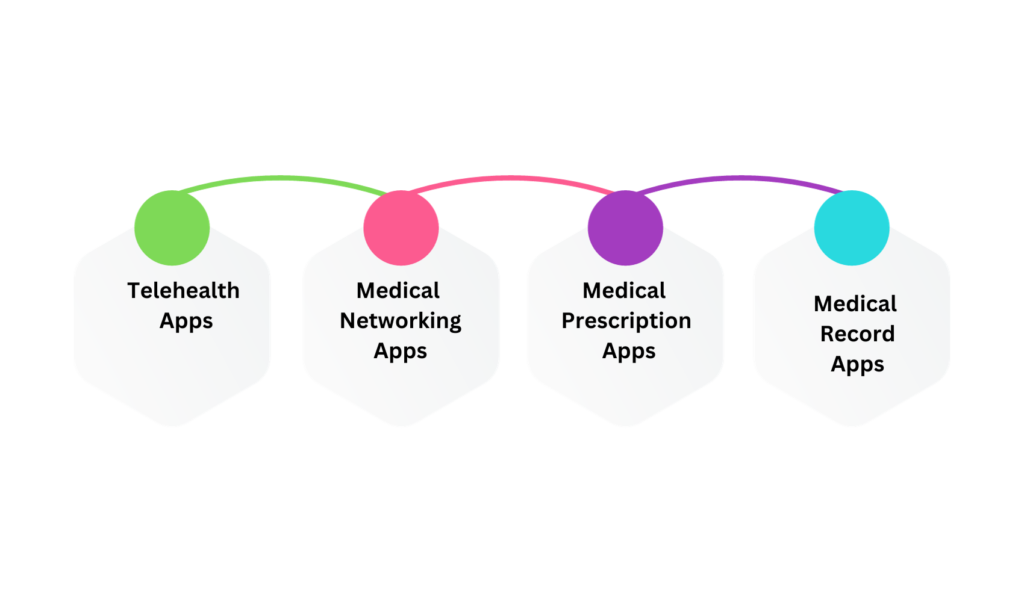
Telehealth Apps
Designed to provide value to medical staff, facilities, doctors, and physicians, healthcare apps for professionals are developed with advanced and reliable features. Some commonly encountered mobile apps for healthcare professionals include:
Medical Networking Apps
Despite the demanding nature of their responsibilities in hospital management and patient services, medical professionals need to engage with other experts in the field, sharing expertise to enhance overall communication processes.
Medical Prescription Apps
Healthcare apps designed for prescriptions assist professionals in selecting the appropriate drugs for their patients, compiling them into a list, and managing usage and timing. Some of these medical apps even offer the capability to print prescriptions for patients to present at a nearby pharmacy.
Medical Record Apps
Health applications for medical records aid in streamlining the collection and updating of patients’ medical data. These records encompass information such as blood pressure, body temperature, medical examinations, diagnoses, prescriptions, appointments, and various criteria for monitoring medical health. Among physicians,YouCoMM, a multi-request format platform developed by Digiatto IT Services and MediTab stand out as two of the most widely used medical record apps.
Healthcare Apps for Patients and General Users
Healthcare software and applications for patients aim to simplify the lives of general users. Offering fundamental medical assistance, these healthcare apps are straightforward yet valuable in addressing various wellness aspects. Various types of mobile healthcare application development for patients include:
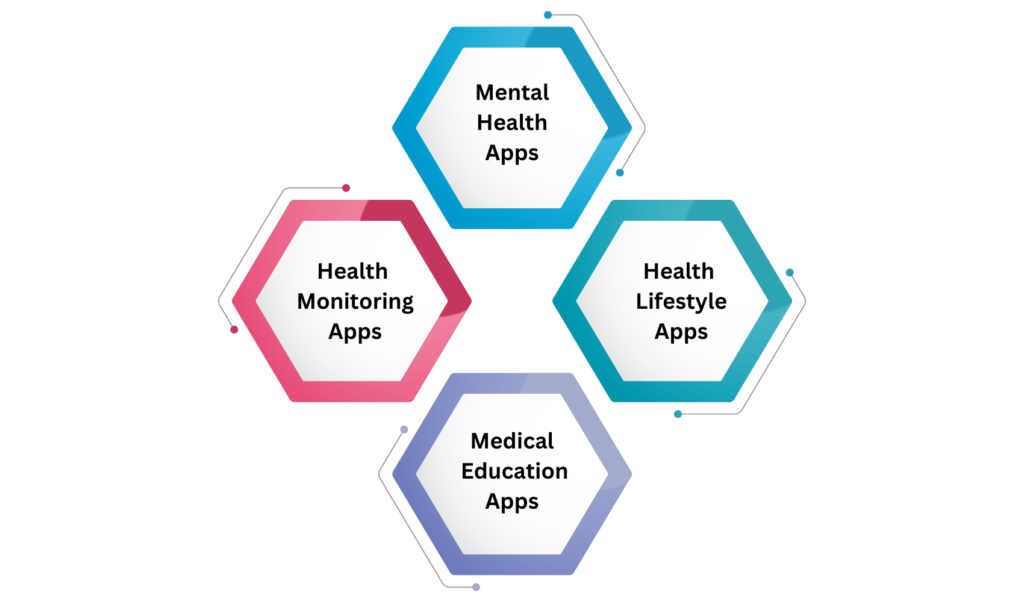
Mental Health Apps
Designed to enhance accessibility, flexibility, and efficiency in therapy for general users, mental health apps focus on addressing issues such as anxiety, depression, and insomnia. These applications often offer support through pre-recorded sessions, gamified elements, breathing exercises, and more. Notable examples of popular mental health apps include Mood Kit, Headspace, and Mindshift.
Health Monitoring Apps
Dedicated to tracking and managing chronic conditions like diabetes and blood pressure, health monitoring apps play a crucial role. Some renowned health monitoring apps include WebMD, Ada, and The Diary. Another notable example is Soniphi, the first resonant frequency-based personal wellness healthcare app developed by Digiatto IT Services.
Medical Education Apps
The fundamental goal of medical education apps is to uphold a dependable database containing current medical information for doctors, students, and medical users. Clinical Sense, MedScape, Prognosis, and Epocrates stand out as notable examples of medical education apps.
Health Lifestyle Apps
Within the realm of mobile healthcare web application development for patients, the health lifestyle category encompasses various applications, including fitness and nutrition apps, self-improvement apps, weight loss apps, mind training apps, pregnancy tracking apps, and more, all aimed at promoting a healthy lifestyle. Notable examples of popular health lifestyle apps include HealthPal, MyFitnessPal, Remente, and MoodPath.
The aforementioned types of healthcare software application development represent the primary categories within the extensive landscape of healthcare digital solutions. For a more in-depth exploration of various medical software types, visit the blog 15 Types of Healthcare Software to elevate your medical business.
How to Develop a Healthcare App? A Step-By-Step Process
Developing a healthcare mobile app entails a series of steps, incorporating best practices and a structured plan to guarantee the creation of a successful and user-friendly application that delivers positive outcomes for both patients and healthcare providers.
1.Define Your App’s Idea and Goal
An important part of the medical or healthcare application development process is to understand your end-user’s needs. Evaluate the problems they are facing and how your application can solve them. At this stage, you should also ponder over the app type. For example, your application can be around diabetes or an anxiety-tracking one.
2.Conduct Market and Regulatory Research
Following an understanding of your target audience’s needs and challenges, it is essential to engage in market research. This involves analyzing competitors and identifying market gaps that your app can address. This research will assist in defining the features and functionalities of your app, aligning with your overarching goals.
3.Hire a Healthcare App Development Company
Enlisting the services of a reputable mobile healthcare app development company guarantees the utilization of essential technologies and trending features, ensuring the success of your app in the healthcare market.
4.Choose the Right Platform
Following the establishment of your app’s objectives, the next step is to choose the platforms for deployment—Android, iOS, or web. Consider incorporating home assistant device integration to ensure that your application is easily accessible through voice commands.
5.Decide the Location for the App Launch
When launching a new app, a common strategy employed by entrepreneurs, business leaders, and tech executives is to initially develop it for their domestic audience. However, if you or your board members opt for an international launch, it’s crucial to consider nation-specific guidelines and user personas, particularly in the context of developing and deploying medical apps.
6.Select a Monetization Strategy
At the core of mobile app development in various domains is the fundamental goal of generating revenue. In the healthcare sector, two prevalent monetization models include a subscription-based approach and a freemium model, allowing paid access to premium services.
7.Pay Attention to UI/UX Design
In the realm of healthcare mobile application development, UI/UX design holds significant importance as it directly influences the success of your medical apps. Typically, older individuals prefer simple navigation and larger fonts, while a younger audience leans towards a vibrant UI with enhanced functionalities.
8.Develop an MVP
A crucial component of achieving success lies in the creation of an MVP rather than a fully-fledged application. Developing an MVP is the most effective approach to guarantee that the solution undergoes thorough testing and validation before its market entry.
9.Test Your App
Testing is a critical phase in the development of healthcare solutions. Perform comprehensive testing and iterations covering aspects such as user experience, user interface, and content.
During the in-depth testing of your healthcare app, focus on the following:
- Security measures for PHI, PII, and compliance with various regulations.
- Ensure the functional operation of your app, particularly in healthcare workflows.
- Verify the safety of the Application Program Interface (API) used for geolocation, if required for proper app functionality.
- Check the app’s ability to interpret data from multiple inputs, including information from various networks, devices, and locations.
10.Launch and Update
Following the conclusive testing and iterations, proceed to launch your app for end-users and monitor its performance over time. It’s crucial to recognize that healthcare app development is a continuous process, with ongoing updates and maintenance being essential. Keep in mind that consistent app maintenance also adds to the overall costs of healthcare mobile app development.
Healthcare App Development Best Practices
Healthcare software development is a complex and challenging process that encompasses numerous sub-processes. It is crucial to avoid starting and getting stuck midway, as this can lead to increased time and expenses.
1.Following all the Compliance Rules
The healthcare industry imposes stringent requirements regarding security and legal protocols. When developing a mHealth application, it is imperative to comply with various legal regulations. Some of the most prevalent compliances include HIPAA, HIMSS, FDC, etc. Before the development of your healthcare app, ensure that it aligns with these regulations.
- HIPAA – Compliance with HIPAA guidelines is mandatory for all U.S. healthcare entities to safeguard the security and privacy of protected health information (PHI).
- CCPA – This legislation establishes confidentiality foundations in the U.S., requiring disclosure to clients about the data being collected and facilitating client data reporting.
- GDPR – Introduced in Europe in 2018, GDPR is a regulation for the protection of personal data. Healthcare apps collecting and storing personal data within the European Union must strictly adhere to GDPR.
2.Single-Focused Purpose
While there are various healthcare app categories like fitness tracking, postoperative care apps, appointment booking apps, etc., businesses should concentrate on a single app category.
3.Interoperability
The fundamental essence of healthcare mobile apps lies in the seamless exchange of information between different devices.
4.Selection of Feature Set
These elements encompass, but are not limited to:
- Health monitoring
- Appointment scheduling
- In-app payments
- Integration with wearables
- Reporting functionality
- Social integration (if it’s a fitness app)
5.Hack-Proof Cybersecurity
Health applications have to be hack-proof security, adhering strictly to cybersecurity measures to mitigate the risk of data breaches and cyber theft incidents.
6.Hardware Choice
The app you plan to launch doesn’t necessarily have to operate exclusively on a smartphone. It could be a wearable app or a desktop version. In any case, it’s crucial to recognize that there are various hardware options available to support your application.
7.Choice of APIs and Integrations
When faced with numerous API functions in the market, making a selection can be challenging. It requires careful consideration to narrow down and choose the one that ensures real-time functionality and enhances the security of your processes.
8.Presence of Medical Practitioners in the Core Team
Having medical practitioners as integral members of your core team is crucial to addressing one of the most intricate issues that can lead to the failure of your mHealth app—mistrust.
Healthcare App Development Features
While there is an abundance of features that you can incorporate into your hospital or medical app, adding unnecessary ones not only extends the app’s development timeline and cost but also complicates the user experience for common users.
1. Telemedicine or Telehealth
The influence of telehealth trends has significantly transformed the healthcare industry, bridging the gap between patients and their doctors or caregivers. The continued adoption of this technology is anticipated to further shape the landscape of home healthcare in the coming years, solidifying its status as a crucial and impactful innovation.
2. EHR
In contemporary healthcare applications, it is essential to incorporate an electronic health record (EHR) feature that enables doctors to seamlessly update the patient’s records within the hospital’s internal system.
3. Notifications
In a hospital app, notifications play a vital role as they serve as reminders for various tasks such as doctor’s appointments, heart rate monitoring, bedtime, medication schedules, hydration reminders, and more.
4. User Dashboard
Incorporating a visually appealing and user-friendly dashboard is crucial for delivering an excellent user experience. Thus, when developing your hospital app, ensure the creation of a captivating dashboard that consolidates essential information for easy access by patients and doctors.
5. Payment Integration
Among the crucial features of a hospital app, payment integration stands out as it offers users a convenient and secure method to pay for medical services. Incorporate diverse payment modes such as debit or credit cards, PayPal, UPI, etc., to streamline payment collection for healthcare professionals.
6. Search Bar
The inclusion of a search feature is indispensable for successful hospital app development. A search bar facilitates users in effortlessly and swiftly navigating the app to access the information they require.
7. Wearable Devices Connection
As technological advancements continue, the integration of IoMT (Internet of Medical Things) – a concept involving the connection of medical devices, applications, and wearables to the Internet – is progressively becoming an integral aspect of our daily lives.
8. Emerging Technologies Used for Healthcare Application Development
App developers are increasingly incorporating emerging technologies into healthcare application development. The integration of these technologies aims to streamline processes, enhance patient care, automate administrative tasks, and improve overall efficiency.
9. Artificial Intelligence
Artificial intelligence takes the lead in healthcare, showcasing its remarkable applications and abilities to analyze patient data and automate rule-based processes. Additionally, AI plays a crucial role in drug discovery, disease diagnosis, the formulation of personalized treatment plans, and predicting health outcomes. Integration of AI-powered chatbots and virtual assistants in healthcare app development enables medical professionals to promptly address patient queries, schedule appointments, and perform various other tasks.
10. Cloud Computing
The incorporation of cloud computing into healthcare apps brings specific advantages, including enhanced health data analytics and improved data security. Moreover, cloud computing provides users with the flexibility to access information from any location at any time.
11. AR and VR
The influence of AR/VR in the healthcare industry is already extensive in various domains, and its market is expected to reach $4.64 billion by 2025. An illustration of AR and VR in healthcare is exemplified by the Fit XR Box VR sports application.
12. Blockchain
Blockchain in Healthcare technology is a noteworthy trend in healthcare mobile app development, offering benefits in managing EMR and EHR data, facilitating research, and enhancing the insurance and hospital billing process.
Custom Healthcare App Development Cost and Time
The duration and cost of healthcare application development can vary based on factors such as mobile app features, UI/UX design, security levels, app platform, and the app development company’s location. These factors should be carefully assessed when establishing a budget for hospital mobile app development.
On average, the total cost and time for building a healthcare app can fall within the range of $50,000 to $300,000 and take 3 to 18 months, respectively. The specific functionalities of the app and other critical factors mentioned above significantly influence the overall development costs.
While various factors contribute to custom healthcare app development costs and duration, features, and functionalities are the most significant elements influencing the overall development costs. To assist you in making an informed decision, here is a breakdown of time and cost based on essential features.
Certainly, several factors contribute to the costs and timeline of developing a custom mobile healthcare app, with features and functionalities being the most significant elements influencing the overall development costs. To aid in making an informed decision, here is a detailed breakdown of the time and cost based on essential features.
Challenges in Medical App Development
Despite the expanding market for healthcare applications, numerous medical professionals hesitate to embark on their healthcare application development journey. Why? Multiple challenges contribute to the failure of mobile healthcare solutions. Understanding these challenges provides valuable insights into why healthcare businesses face difficulties and enables the development of cutting-edge solutions that can make a significant impact in the market.
Lack of Detailed Focus in One Domain
When a doctor or patient installs a health app, they typically seek a solution for a specific issue, not multiple issues. Therefore, rather than having an application that superficially addresses numerous problems, a healthcare app that delves deeply into addressing one specific point tends to have a higher success rate.
Non-Compliance with the Law
Various compliance bodies oversee the conduct of the mobile health domain. While achieving compliance with industry-specific regulations can be challenging, the lack thereof can be a significant reason why healthcare stakeholders may lack confidence in the application.
Lack of Security
While security should be a top priority for every healthcare organization, only a few apps take this responsibility seriously. Numerous incidents highlight the compromise of patients’ data due to insecure storage infrastructure, raising concerns about data breaches and mishandling.
Presence of Multiple Channels and Devices
The influx of various devices into the market, such as smartphones, personal assistants, smart TVs, wearables, etc., has posed a significant challenge for healthcare application development in terms of interoperability.
Despite the expanding market for healthcare applications, numerous medical professionals hesitate to embark on their healthcare application development journey. Why? Multiple challenges contribute to the failure of mobile healthcare solutions. Understanding these challenges provides valuable insights into why healthcare businesses face difficulties and enables the development of cutting-edge solutions that can make a significant impact in the market.
How Can Digiatto IT Services Help You with Healthcare App Development?
In the ever-evolving healthcare landscape, the significance of healthcare app development cannot be overlooked. It has emerged as a revolutionary means to streamline operations, manage data, improve patient care, gain competitive advantages, and redefine the healthcare industry.
As a prominent healthcare app development company, we specialize in crafting tailored medical software and applications. Our expertise spans clinical management, efficient patient treatment, and diagnosis, offering top-notch healthcare app solutions to enhance various elements within the healthcare industry.
Our comprehensive range of services encompasses:
- Telehealth app development
- EHRs Software development
- Medical insurance apps
- Laboratory management Software
- Process management
- Lifestyle tracking
- Software integration, and much more
For a closer look at our proficiency in crafting state-of-the-art mobile apps across diverse domains, including healthcare mobile app development, explore our portfolio to make an informed and confident decision.
Talk to us to digitize your healthcare business today.
FAQs
Q. How much does it cost to develop a healthcare app?
The cost of developing a healthcare app typically falls within the range of $50,000 to $300,000 or more. The total expense is influenced by factors such as the chosen platforms (iOS, Android, or both), the technology stack, the complexity of features, and other relevant considerations in medical app development.
Q. How long does it take to develop a healthcare app?
The development timeline for a healthcare app typically spans from 3 to 18 months on average. However, the specific duration can be influenced by various factors that either expedite or extend the hospital app development process.
Q. How much does it cost to develop a healthcare app?
Healthcare experts emphasize that the key to a successful healthcare app lies in offering comprehensive and actionable information. Users often download healthcare apps to monitor and track their well-being. Thus, providing accurate and relevant information and solutions to users can significantly contribute to the app’s success in the market.

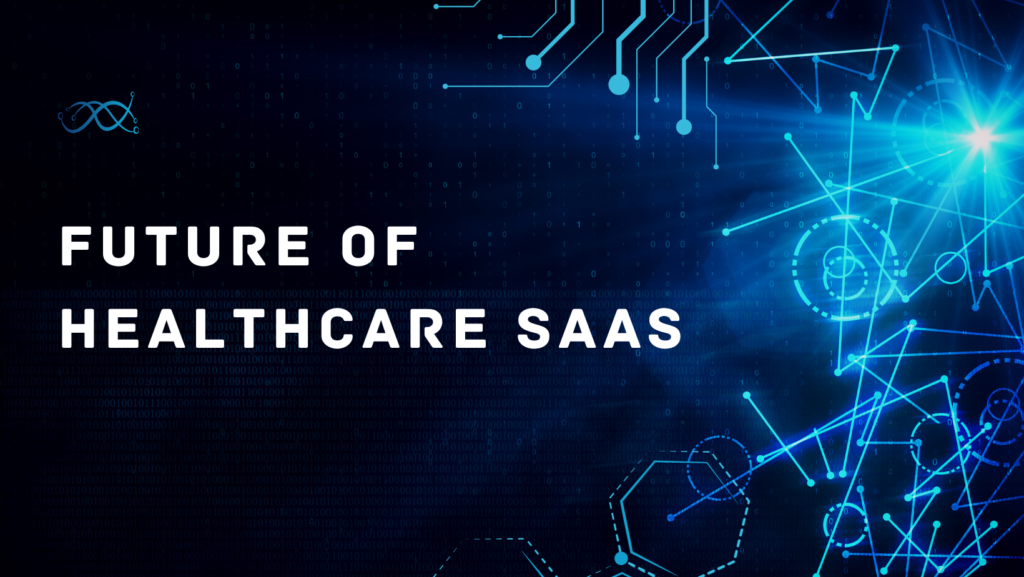
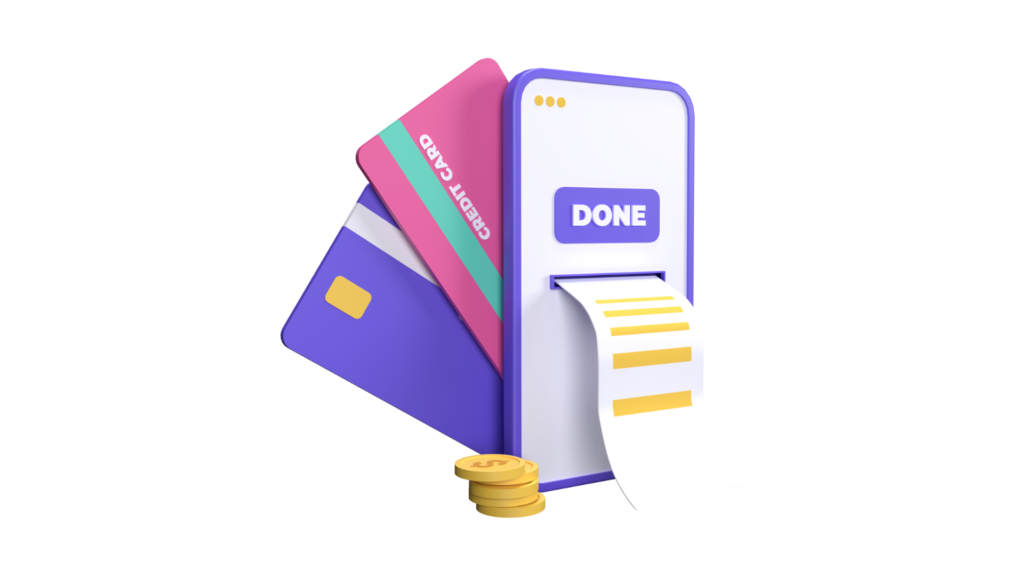
Pingback: Healthcare Business Startup Ideas for Aspiring Entrepreneurs - HealthSaaSPro
Pingback: Entrepreneur's Guide to HIPAA-Compliant Mobile App Development - HealthSaaSPro